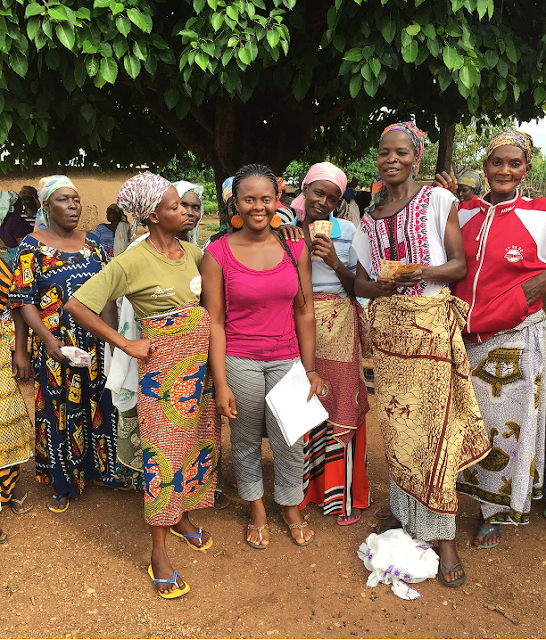By Nana Araba Asaam, 1st year MDP student
“No matter how you measure it, women and children bear
the brunt of poverty. But it’s also clear that women are our greatest hope for
ending it. I have long believed that if you change the life of a girl or woman,
you don’t just change that individual, you change her family and then her
community.” Dr. Helene Gayle, President/CEO of Care USA.
 |
| Giving out cash to women farmers at Zoosali for purchasing certified seeds |
Since it is generally believed that women are the
primary caregivers of children, the program to a large extent targets women in
the rural communities to effectively address issues confronting children. The
program directly supports over 1,000 school children by providing tuition fees,
uniforms, learning materials and interventions to improve the learning
environment. In recognition of their primary caregiver role, the program also
supports women’s livelihood activities, such as crop and animal farming, and
beekeeping. It also provides training for Village Savings and Loans
Associations (VSLA) among the women to boost their household income status and
financial decision making capacity.
 |
| VSLA group at Sang after distribution of share saving and profit |
I have been incredibly impressed by the hard work done
by most women in the Northern Region despite the many challenges they face.
Besides issues of cultural and male dominance and gender inequality, the women
labor under numerous daily tasks such as walking long distances to farm,
collect firewood, cook, clean, get water, care for children and more. Whereas,
the men only weed farm lands seasonally, and most of the days sit under trees
to play board games with friends. It has become quite obvious to me that there
is a long way to go toward achieving equal task distribution and gender
equality in the rural communities of the Northern Region. It is however
comforting to realize that the INCOME program among other intervention programs
undertaken by RAINS are steps in the right direction. My hope is that with time
and the ongoing economic empowerment of women, a way will be found for more
equal distribution of labour at household and community levels.
I have spent a lot of time in the Zoosali, Bidima,
Kpachilo and Sang rural communities and walked many miles to visit farm lands
and beehives of the women farmers. I must admit that I am highly impressed and
inspired by their strength, selflessness, continuous persistence, hard work and
resilience to lay a better foundation for the future of their children and
communities.
I am happy and grateful to be contributing to this
program, learning from the RAINS team and my women friends whom I have formed
beautiful relationships with. I pray and hope for the day when the children
will thrive and be free from poverty and my friends will be totally empowered.


No comments:
Post a Comment